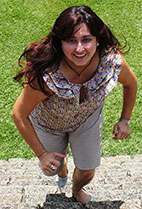|
||||||||||||
|
Skip Navigation | |||||||||||
Meet Two of the Newest Members of the College continued from page 4
Dr. Suyapa Portillo, who also arrived in the 2010/11 academic year, is proud to make her home at CSUN, teaching in the nation’s first and only Central American Studies program. “This program is important to the entire academic community because it struggles to provide an interesting balance between the academic study of history, culture, and the current situation in Central America and the Central American community in the United States,” says Portillo, who came to CSUN on the heels of earning her Ph.D. in history at Cornell University in Ithaca, N.Y. “It really brings together international and domestic issues for the Central American community, helping students to grapple with sometimes contradictory and challenging themes within the study of migration, diaspora, history, and memory—and the cultural, historical, and political productions that these elicit.” Born in Copán, Honduras, Portillo migrated to the United States as a child with her mother and settled in Los Angeles, home to more than half of the nation’s Central American population. She grew up in the Echo Park/Highland Park area, where her mother served as chief shop steward for the Local 11 affiliate of Unite HERE. “I grew up in the union hall and around immigrant workers’ struggles,” Portillo says. After earning her bachelor’s degree with a double major in psychology and Latin American literature at Pitzer College in Claremont, Calif., Portillo returned to Los Angeles to work as a union field organizer and as an advocate for community-based organizations. Such concerns would inform her later graduate work and career. Dr. Portillo’s research interests focus on Honduras and Central America, with particular attention to labor aspects of the history of the banana export industry, marking “the intersections between labor, gender, ethnicity, and race in workers’ lives.” She has extensively explored plantation worker activism in the formation of labor unions and federations and campesino organizations. She continues to challenge popular stereotypes of Hondurans through her examination of the life histories of workers leading up to the general strike of 1954, during which more than 40,000 employees of the two largest banana exporters in Honduras walked off their jobs, bringing the industry to a halt and eventually winning union recognition and substantial increases in compensation. These personal narratives “demonstrate the complex negotiations involved in creating community, organizing for survival and mutual aid, resisting company control, and adapting to conditions of the fincas [living areas] in Honduras,” Portillo says. Her work has much contemporary relevance. With labor unions and immigration hyper-politicized in the United States, it’s worth looking at past efforts to build community across seemingly diffuse populations. “One can no longer look at Latin America, and in this case Central America, without examining and observing the dialectical relationship of Central American immigrants in the U.S., Canada, and Spain,” Portillo says. In addition to studying the enormous contributions of labor activists, Portillo is interested in Central American immigration issues, with a special focus on movements and migrations among lesbian, gay, bisexual, transgender, intersex, and queer Latinas/os. She spends much of her free time volunteering with LGBTIQ community organizations both in Los Angeles and Honduras. “Raising awareness about the discrimination faced by the transgender community is really important to me,” she says. Settling in nicely at CSUN, Portillo notes that her favorite aspects of teaching include “getting to know students—finding out about their family history, how they ended up at CSUN, and how they chose their major.” — Submitted by Teresa K. Morrison |
|
|||||||||||
|
||||||||||||
